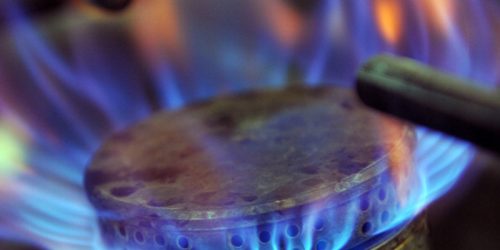ISLAMABAD: Strongly opposing a petition for almost 110 per cent higher gas rates, various stakeholders on Wednesday demanded rather substantial reduction in prices in line with drastic fall in international oil prices.
The Oil & Gas Regulatory Authority (Ogra) had called a public hearing on the request of Sui Northern Gas Pipelines Limited (SNGPL) which is seeking almost 110pc increase in prescribed prices for fiscal year 2020-21. The hearing was presided over by Ogra Chairperson Uzma Adil Khan.
The SNGPL has sought an increase of Rs622.94 per mmbtu (million British thermal unit) effective from July 1 to meet its estimated revenue requirements of financial year 2020-21. In addition, the company also demanded Rs102 per unit cost of imported gas (LNG) to be transferred to consumers.
The representatives of CNG Owners’ Association and All Pakistan Textile Mills Association (Aptma) objected to the huge increase in gas prices. Both parties said the gas prices were required to be reduced to pass on the benefit of lower international oil rates to consumers since the producer prices of gas were directly linked to global oil prices.
The company in its revised petition demanded that average prescribed gas price be set at Rs1,287.19 per mmbtu against the current prescribed gas price of Rs664.25 per mmbtu while the cost of RLNG provided to domestic consumers should also be recovered at the rate of Rs102 per unit.
The All Pakistan CNG Association (APCNGA) and Aptma rejected the move, stressing that such a massive increase in cost of gas would kill the fragile economy.
Aptma Executive Director Shahid Sattar said that SNGPL should not be allowed to cover its losses from the LNG business. The gas company is spending too much money on the Board of Directors meetings and burdening the consumers for it, he added.
The Aptma representative proposed that SNGPL should maintain a separate account for LNG and indigenous gas business, stressing that any increase in gas rates at this stage would have devastating impact on industry and business.
APCNGA Central Chairman Ghiyas Abdullah Paracha said the earlier price hike was also illegal which must be reversed as the energy prices were retreating across the world but the gas prices were not being reduced in Pakistan. According to Clause 7 of the Ogra Ordinance, the government can increase or reduce the price of natural gas after Cabinet’s approval, he said.
“The government must issue policy guideline to Ogra under Rule 21 of the Ordinance before the public hearing which was not issued until June 24, therefore, Ogra’s determined gas tariff could be applicable from July 1. Clause 8A of the Ogra Ordinance empowered only the regulator to fix the tariff of gas for retail consumers which cannot be changed by the government,” he added. However, he said, the government can impose developmental surcharge and taxes.
Paracha said that the price determined by Ogra will be final. He noted that in June 2019, Ogra determined the price of gas at Rs637 per mmBtu but the tariff was pushed up to Rs1,283 for the CNG sector which was illegal and therefore it should be reversed.
He said the price of local gas was linked to crude and high sulfur furnace oil which had come down by 35pc to 50pc. He said gas rates should be reduced by 40pc as the prices of LPG, flare gas, petrol, diesel and furnace oil had dropped.
The Ministry of Petroleum — through a letter on March 10 — directed the gas companies to reduce UFG losses from 6.3pc to 4pc, cut profit from 20pc to 15pc, reduce depreciation by 1pc and cut transmission and distribution losses but the directives were not followed, Paracha argued.
He informed the meeting that imported LNG is being provided to different sectors without securing payment and the entire burden is being shifted to consumers of natural and imported gas.
Ogra chairperson observed that reduced oil price in the international market can result in a reduced price of gas, noting that the impact of fluctuation in the price of dollar should not be shifted to consumers illegally.





